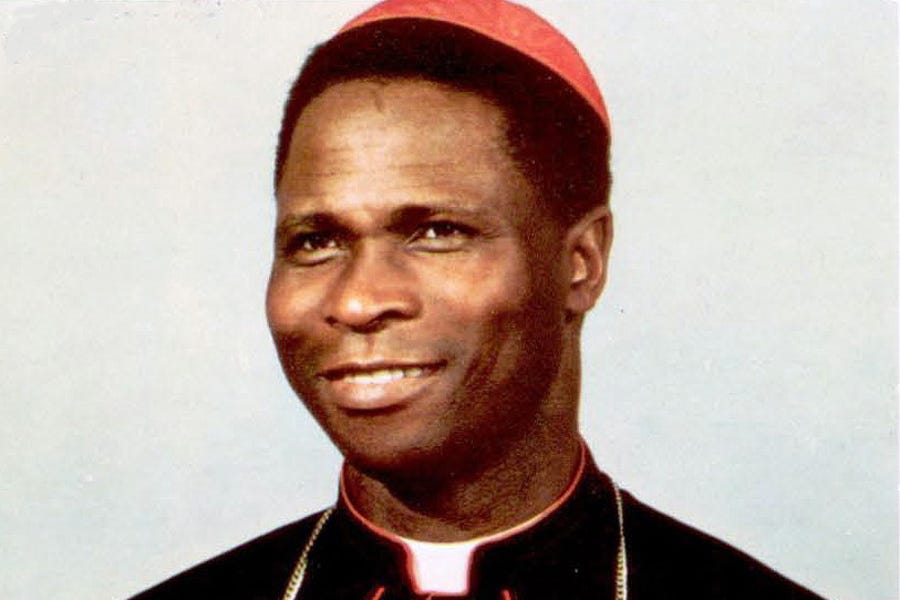Pillar subscribers can listen to Ed read this Pillar Post here: The Pillar TL;DR
Happy Friday, friends,
Today is, of course, the annual March for Life here in Washington. For a generation of us born and raised after Roe v. Wade, seeing the end to that Supreme Court decision was the lodestar of the pro-life movement. It was, for many of us, the reason we marched; opposing it was the mission, the practical purpose of being “pro-life” in America.
But Roe is gone now. And, following the last election, the specter of federal legislation to enshrine the right to kill the unborn has receded, at least for the time being.
Why and for what, then, do we march in the capital? For a start, we can and should march in celebration and thanksgiving for what has been achieved already. For many of us, marching for the overturning of Roe felt a lot like marching for peace — for sure we wanted it, but I at least didn’t hold out much hope of seeing it.
That we have lived to see the impossible must be marked.
And there is more to do.
I, of course, would like to see a national abortion ban every bit as sweeping and comprehensive as the protections for abortion demanded by the other side of this issue.
In the meanwhile, while redoubling our efforts at the local level is essential, we should not doubt the power and the importance of continuing to show up en masse on the national stage, or its effect on the new administration.
Consider the pardons signed by President Trump yesterday, freeing 23 pro-life protesters imprisoned for years for witnessing to life, including Lauren Handy and Fr. Fidelis Moscinski.
While everyone of goodwill should be thankful for their release, I would note that they were not front of the line for clemency; they came several hundred people back in the queue, behind what the president has called “political hostages” from the Jan. 6 riot — including those who violently assaulted police — and the man who founded and operated the world’s largest online criminal emporium.
We should not doubt for a second that their pardons, issued on the eve of the March for Life, were an acknowledgment of the force of the pro-life movement’s public witness and solidarity with them.
And that witness and solidarity needs to be redoubled in front of this administration, which has not yet reinstated the Mexico City policy blocking federal funds for abortion providers and advocates — or given any clear signal that it plans to.
To the world — including, I suspect, to President Trump — people like Lauren and Fr. Fidelis are “radicals” and “extremists” who disturb our peace. If we are honest, they appear as such to the vast majority of us in the pro-life movement, too.
Because if we really believed and understood and appreciated what is happening in abortion clinics as they do, we would have been there blocking abortion clinics and going to prison with them.
I have said before, and I repeat again, my belief is that a half-century of legal abortion in this country has effected a kind of mass psychosis on American society. We repress our understanding of what is actually done among us, and to the least of us, lest it send us mad.
“Some people hear their own inner voices with great clearness. And they live by what they hear. Such people become crazy... or they become legend,” so observed the great American writer Jim Harrison.
People like Lauren and Fr. Fidelis, in my estimation, hear those voices with imperative clarity and live by what they hear. By their actions, and their witness, they become legends for life. But they are not crazy.
Rather, it seems to me they may be the last sane people in this country. May the truth they live by be set free along with them.
Here’s the news.
The News
As the March for Life gets underway, a lot of Pillar readers (in the best way) will be marching too.
For those of you who haven’t made it to Washington, this is a great way to ride along in spirit.
—
Cardinal Víctor Manuel Fernández said this week that there are “worse but less publicized” abuse cases than that of disgraced former Jesuit Fr. Marko Rupnik.
In an interview with the weekly magazine of the Spanish bishops’ conference, Alfa y Omega, the cardinal gave an update on the progress of the most notorious abuse case in recent years — with Rupnik accused of abusing dozens of religious sisters over decades, including through blasphemous acts.
In the context of discussing his desire to see a new canonical crime of “spiritual abuse,” Fernandez said that Rupnik’s case is in motion, but far from an outlier. Which is a grim thought indeed.
—
The dictatorship of Daniel Ortega confiscated the seminary of the Matagalpa diocese this week, as persecution of the Catholic Church in Nicaragua continues.
According to local sources, the San Luis de Gonzaga Seminary had around 60 seminarians. About half were present when police arrived at the site - the others had not yet returned from vacation.
Local sources told The Pillar that no decision has been made about how the seminarians will continue their formation. It is expected that they will move to the interdiocesan seminary in Managua.
The embattled diocese was home to Bishop Rolando Álvarez, whose criticism of the regime led to his arrest in August 2022, and his subsequent 25-year prison sentence on charges of conspiracy. After beginning his prison sentence, Álvarez was exiled to Rome in January 2024 and has lived there ever since. Before Álvarez was exiled, the seminary had more than 100 seminarians.
Read the whole story, and pray for the Church in Nicaragua.
—
The Institute for Works of Religion managed last month to offload one of its most troublesome investments — a major stake in a landmark Budapest property.
The historic 1905 Exchange Palace, was at the center of a marathon legal battle between the IOR and its investment partners, with the Vatican bank making repeated efforts to sell out of the deal. But in December it was acquired by a company owned by, of all people, Prime Minister Victor Orbán’s son-in-law.
The Vatican bank has finally managed to exit a long-running legal scandal and, it seems, to have escaped potentially spiraling losses.
But as I noted in an analysis this week, the deal could also mean that the IOR owes an unexpected and ironic thank you to the Vatican’s Secretariat of State — perhaps the bank’s least favorite Vatican department.
—
Cardinal Christoph Schönborn celebrated his 80th birthday Wednesday, and Pope Francis marked the day by accepting his resignation as Archbishop of Vienna, as expected.
As Luke Coppen noted this week, the brief line in the Holy See press office’s daily bulletin hardly does justice to the cardinal’s decades-long career, or the impact he has had across three pontificates — both in Vienna and for the global Church.
Schönborn is one of the few figures strongly associated with the theological project of John Paul II-Benedict XVI who adapted smoothly to the Francis era. Some thought this revealed a malleable personality, others that Schönborn played a vital bridge-building role between two ecclesiastical worlds.
—
The Holy See announced Monday the suppression of a Chinese mainland diocese and the creation of another, along with the consecration of the new see’s first bishop.
It’s the latest in a growing line of diocesan redistricting moves undertaken on the mainland and, as with episcopal appointments, the signs are growing that Beijing has found a way to get what it wants while allowing Rome at least the minimal amount of participation necessary for canonical validity.
In this narrow sense at least, the Vatican-China deal could be said to be working and, as Secretary of State Cardinal Parolin put it last week, “slow progress” even amid some “backward steps.”
But as I asked in an analysis this week, is this progress — at whatever speed — going anywhere? No matter how many diocesan suppressions or erections Beijing and Rome successfully collaborate on, it doesn’t sanate a single previous invalid move by the CCP.
And even if the Chinese government chooses to recognize dozens of formerly underground bishops as the legitimate occupants of their sees, it doesn’t free a single detained cleric.
Chinese Catholics know and see all of this. And they understand the growing “sign of contradiction” the Church in China is becoming. So what are they to make of that?
—
An Italian bishop praised by Pope Francis is reportedly facing a Vatican investigation as well as a civil trial for perjury.
The Vatican is said to have sent an apostolic visitor to Sicily to assess accusations against Bishop Rosario Gisana of Piazza Armerina after a public prosecutor decided he should stand trial for perjury. Gisana will be the first Italian bishop to face trial over the handling of an abuse case.
The Piazza Armerina diocese said this week that Gisana was “calmly following developments in the ongoing criminal proceedings.”
“While reaffirming his denial of the accusations, he reiterates his confidence in the judiciary’s work,” the diocese said.
Become a True Leader with an MBA from the University of Mary. Gain the confidence of an executive, the insight of a specialist, and the integrity to be a champion for the Common Good. Pillar paid subscribers receive an exclusive $10,000 scholarship - Apply today!
Who’s the boss?
Cardinal Fernández’s comments this week on the progress of the Rupnik case struck me as highly noteworthy for a number of reasons.
On the progress of the case itself, it is interesting to me that it seems to be taking some time to, as the cardinal put it, “constitute an independent tribunal” to bring Rupnik to trial.
In the past, I have myself been involved as a canonist in cases that rise to the level of a full canonical trial at the DDF, cases in which finding judges who could be “independent” of the case was essential, and it was never my experience that this was an especially time-consuming process.
On the contrary, the DDF maintains a roster of qualified canonists of all clerical ranks, and choosing among them is not something which should require much difficulty at all — unless the dicastery is looking to hand the matter off to a more locally constituted court. In which case, the question arises: local to where?
The cardinal himself indicated that the evidence and testimony from the investigation was on a near-global scale, so there’s no obvious reason why the matter wouldn’t be best resolved in the dicastery itself.
I was also struck by the cardinal noting other “worse but less publicized” cases than Rupnik’s blending spiritual abuse with sexual abuse. I have no reason to doubt Cardinal Fernández’s assessment.
But being familiar with the allegations against Rupnik — that he used the sacred vessels used for the consecration in Mass as, forgive me, sex toys, and broke bones of his victims in the course of his abuse — it is shocking to think, even familiar as I am with some of the worst crimes the Church has to deal with, that there are several worse cases in train at the DDF.
If that is the case, it would seem to me to argue not just for a new norm criminalizing spiritual abuse in canon law, as both the cardinal and I would like to see, but for the DDF to be much more forthcoming than it has traditionally been about the kinds of cases it is receiving and how they are handled.
I am not saying the DDF should be holding open court, or calling press conferences to air the details of cases which would shock and disturb the faithful, and pile added pressure and distress on victims.
But the lack of a usable body of penal jurisprudence is a real impediment, both for canonists in dioceses everywhere in making sure these cases are handled well from the very beginning, and for bishops and religious superiors seeking to craft appropriate safeguarding policies.
Stepping back from the Rupnik case altogether, though, I was thinking yesterday about Fernández’s role in the DDF’s disciplinary work as I was writing this newsletter.
Specifically, I was thinking about how, on the day Fernández assumed office, Pope Francis signed a derogation from the DDF’s operations regulations, obtained by The Pillar, excusing Fernández from leading or even attending regular meetings of the disciplinary section when it meets to discuss and decide cases of clerical sexual abuse of minors.
The pope made this provision, essentially carving the cardinal out of the loop on abuse of minors cases, because of serious questions about his competence in handling such matters when he was a diocesan bishop.
Fernández does, however, still attend and chair weekly meetings of the DDF’s disciplinary section on cases involving crimes against the sacraments — which would include cases like Rupnik’s.
“Many dicasteries [including his own] continuously received complaints on situations in which spiritual elements were used as an excuse or motivation to have sexual relations,” Fernández said in his interview this week. And that certainly rings true to me.
But it raises an interesting question about who at the DDF is ultimately in charge when such cases include both sacramental crimes and spiritual abuses and the abuse of minors: Fernández, or the head of the disciplinary section, Archbishop Joseph Kennedy?
What practical role and influence does Fernández have in cases of sexual abuse of minors when there is a spiritual component to the abuse — and how does that align with his mandate from Pope Francis?
These seem like important questions that bear immediately on high-profile and sensitive cases in the life of the Church. And, given the crisis of confidence occasioned by the clerical abuse scandals of recent years, understanding who is in charge of what seems an important point to clarify.
Now, at this point, I had written a somewhat lengthy treatment of the urgency of clarifying how these mixed disciplinary cases, involving both abuse of minors and the sacraments, are handled and under whose authority. I’d also unpacked the bearing this point may have on specific cases that are already in the public eye.
But this morning I received an email from Cardinal Fernández — who is apparently a Pillar reader (in a good way) — opening an exchange on exactly this point.
Now, I always prefer to do straight reporting over even the most informed analysis so, in the hopes that His Eminence will be open to a constructive discussion of these issues, I’m going to leave it here — we’ll report more later when we have more to report.
Hopefully.
Star children
TikTok is not dead yet, much to my chagrin. The Chinese spyware and disinformation platform has been given a reprieve from closure or forced sale by the new administration.
I can scarce count the benefits to our national security, social wellbeing, and general mental health which might come with turning off that noxious spigot of triviality and falsehood. But, I learned this week, one of them would be cutting millions of young Americans off from their supply of astrology, to which millions are apparently turning to make sense of the world.
It turns out that millions, but millions of horoscope videos on the platform are getting millions of views from Gen Z users and, I read in The Times this week, apps combining AI with NASA data and astrology content have tens of millions of users.
Now, it’s easy to mock people who would fall for such nonsense, and wonder that in our day there are people weird enough to think the literal movement of literal stars determines the course of events around them.
Indeed, part of me would like to spend the rest of this newsletter doing exactly that. But there’s something too serious here to ignore in favor of ridicule, however easy the target.
According to some of the Gen Zers The Times spoke with for the report, they are turning to such obvious hoaxes as astrology in search of “a way to understand the chaos within and around them,” and an answer to “the current digital and mundane age we live in — increasing isolation, a lack of direction from previous generations, anxiety over the present and future, the lack of meaning.”
These are very real circumstances and impulses. Indeed, they form the basis for what can be called the natural religious urge: to sense our relative powerlessness, our primal fears for survival, and our yearning for meaning and communion, and to reach out for that which has power over it all.
This is, as some call it, the “God-shaped hole” into which humanity is forever pouring its time, attention, treasure, and essence, even if it is sometimes in denial about it.
Now, I don’t know how many of the millions of young astrology consumers are actual believers in all this. But my guess would be most of them consider themselves smart marks, to use a pro wrestling term — they know it's not really real, but they enjoy it while playing along as if it was. They consume their nonsense horoscopes as bromides for their general existential fears.
The crying need for evangelization here is obvious. But, I think, it would be a mistake to take their natural religious impulse and simply direct it to Christianity.
At root, humanity’s longing for God is rooted in fear and need: fear of what we cannot control and need for those things that we understand we cannot either provide for ourselves or protection from those things we cannot defend ourselves against.
There’s a version of Christianity that simply pitches the Triune God as the reasonable answer to these existential terrors and yearnings, the rightful object of our worship and supplication, and the merciful responder to those who seek Him. Many, I am sure, would be glad to hear it.
But if none of that is wrong, per se, it’s badly incomplete. The driving force of natural religion and its relationship to God is fear. What Christianity holds out is something else — something unnatural, indeed supernatural — faith.
Faith, in the Christian understanding of the word, recognizes that we don’t go looking for God in the void. God moves and acts first to make Himself known, and He does it for love of us. This is the narrative of Abraham, Moses, and indeed the power and import of the Incarnation.
Can Christianity direct the impulses of fear and need and answer them? Sure. But the true power of the Gospel is to subvert them and explode them entirely — death isn’t answered, it is overthrown.
God doesn’t designate us more or less worthy servants, but beloved sons and daughters.
Our sufferings aren’t merely explained, rationalized, and mitigated but ennobled.
Our lives and the events that shape them are driven neither by a cold inevitability nor by an indifferent randomness; they are part of an authored history, the only and ultimate aim of which is to effect our salvation.
The great dynamic force of our lives and relationship with God is not fear but love.
That’s not a truth many of us find easy or comfortable to articulate. And it is one we can think will meet with cynicism and rejection. But I ask you, what should be harder to believe: that God loves you, or that truth can be found in TikTok astrology?
See you next week,
Ed. Condon
Editor
The Pillar






